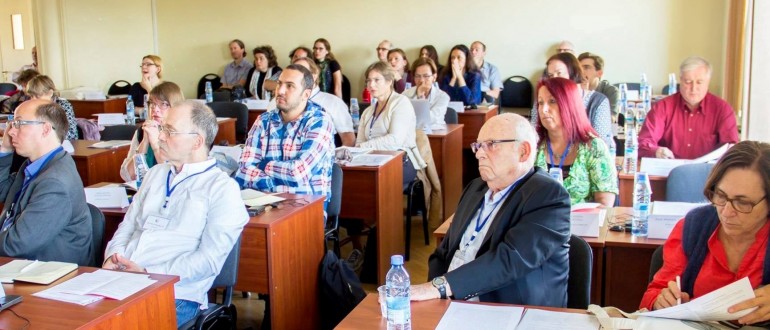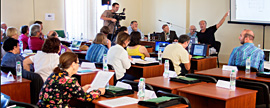|
THE 12th INTERNATIONAL SYMPOSIUM ON TRADITIONAL POLYPHONY 25– 28 September, 2024, Tbilisi, Georgia |
International Research Centre for Traditional Polyphony of Tbilisi State Conservatoire and Anzor Erkomaishvili Folklore State Centre are inviting scholars working on the problems of polyphony to the 12th International Symposium on Traditional Polyphonic, to be held on September 25- 28, 2024.
One of the features of the symposium is the diversity of themes, which is allowed for by the interdisciplinary character of ethnomusicology.
Official languages of the Symposium are English and Georgian. All the papers will be published after the symposium in both English and Georgian.
Complete information including the history of previous symposia, information on the participants, contents of the bilingual books of proceedings with full texts of all symposium papers and further information about the International Research Center for Traditional Polyphony of Tbilisi State Conservatoire is provided at the Web Site: www.symposium.polyphony.ge
Topics of the Symposium:
Participants are encouraged to submit abstracts on all aspects of traditional polyphony. The submitted papers will be grouped according to the themes and issues discussed in them and will be presented at the corresponding session. This will allow us to better cover the wide range of issues of polyphony.
Along with traditional areas of interest, we would like to present one new topic at the 12th symposium:
Bodily-kinaesthetic aspects in traditional music performance.
Within the framework of the topic, we welcome all studies that consider inclusion of the physical aspect in one way or another in the process of traditional music performance – from dance to the physical process of sound production or various performing gestures.
The other themes are:
- General Theory, History, and Musical-Aesthetic Aspects of Polyphony
This topic considers a wide range of general problems of polyphony, characteristic of contemporary cultural anthropology.
- Regional Styles and Musical Language of Traditional Polyphony
This theme unites wide range of regional studies of the polyphonic singing styles, encompassing huge regions as well as in-depths studies of a small region, ethnic minority, or village.
- Comparative Study of Traditional Polyphony
It is impossible to have a comprehensive understanding of the phenomenon of traditional polyphony without a comparative approach. We invite scholars to work on the development of new methodologies in this direction.
- Sociological Aspects of Traditional Polyphony: Performers and Listeners; Gender, Age, Identity.
A wide range of topics on different aspects of the social life of traditional communities’ social life is covered under this theme. These problems will be viewed in relation to contemporary life and from historical perspectives.
- Polyphony in Secular and Sacred Music
Interactions between traditional polyphony and early forms of professional polyphony in various European countries are the main topics of this theme, although papers dedicated to other regions and time span are also welcome.
- Traditional Instrumental Polyphony
Although the central topic of the symposium is vocal polyphony, different aspects of the interaction of vocal and instrumental polyphony might be discussed under this theme
- World Music and Traditional Polyphony
“World Music” might be seen to express the aspiration of different cultures towards harmonization, while the idea of the “Global Village” is suggestive of the universal character of music. Interested people travel to study the singing traditions of “other” cultures in situ; traditional singers are invited to teach in other countries. What is lost or gained in this process?
Round table:
Traditional concept of archiving and modern challenges:
The archive, as the main repository of human memory, is a dynamic organism, in the cycle – collecting/safeguarding/revival – the phases constantly replace each other. A general trend of the 21st century is that a large part of traditional musical culture continues to exist by re-creating (re-making) the heritage archived in the previous century.
The viability of an archive is determined by the culture it preserves, by current cultural policies, by the people who create and run the archive, and by the ideas and goals on which it is based. Therefore, any national or private archive creates its own survival strategy.
At the round table, we would like to discuss the following topics:
- What is the role of archives and archival material in today’s traditional music?
- To what extent does general cultural policy determine the policy for the functioning of national archives?
- To what extent do innovative approaches to open access determine the viability of archival material?
- How does the archiving process of new 21st-century examples of traditional music work? Who determines which of them is subject to archiving, and in what form?
Proposals
The Program Committee encourages the submission of individual, panel, and round-table proposals:
- Individual paper will be allotted up to 20 minutes followed by 10 minutes for questions and discussion;
- A panel presentation includes two or three papers of, 20 minutes each, followed by a 10 minute discussion;
- A round table session (up to 2 hours) includes not more than four presenters (7 minutes each). The audience is encouraged to participate in the discussion.
Abstracts, short biographies and complete papers
Abstract and short biography – both texts no more than 1800 characters (both should be inserted in the online registration form).
Complete text of papers: no more than 7 pages, font size 12, spacing 1.5.
TIMELINE
Deadline for online registration: 15 April, 2024
Notification of acceptance: by 15 May, 2024
The deadline for submitting the complete text of the presentation, considering the time required for translation: 25 July, 2024
Registration fee
For scholars – 80 USD
For students – 30 USD
The costs of accommodation and cultural program will be covered by the Organizing Committee of the symposium.
The Organizing Committee plans a one-day cultural program for the participants – a visit to one region of Georgia.
The Tbilisi International Symposium is not only a scientific forum on the issues of traditional polyphony, but it also presents the traditional music of Georgia and other countries. We expect that the symposium will see the presentation of world polyphony by ensembles from different countries of the world. Also, traditional music workshops are planned.
The Program Committee
Dr. Rusudan Tsurstumia (Georgia)
Dr. Joseph Jordania (Australia-Georgia)
Dr. Izaly Zemtsovsky (USA-Russia)
Dr. Maka Khardziani (Georgia)
Dr. Teona Lomsadze (Georgia)
Dr. Nino Tsitsishvili (Australia-Georgia)
Dr. Daiva Raciunaite-Vyciniene (Lithuania)
Dr. Caroline Bithell (UK)
Contact information for Symposium participants
Ana Lolashvili: polyphony@tsc.edu.ge
Joseph Jordania: josephjordania@yahoo.com.au





